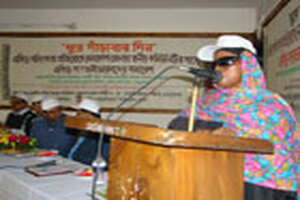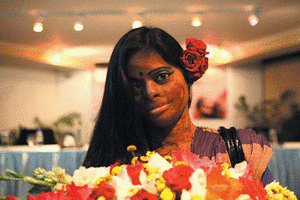
Angura Begum
Satisfied with her two beautiful children Roni and Popi, she had grown an invariable and unquestioning trust towards her husband. However, on September 19, 2004, her life had taken on a different path than that which she had anticipated. As midnight struck, Uddin did not delay to undertake his malevolent plan. His inhumane nature had enabled him to shower his own wife with acid during her sleep, resulting not only in disfigurement of her appearance and a complete loss of vision but also in a deconstructive mental and physiological impact. Sleeping Angura, taken by surprise at this attack, was mendaciously informed by her husband that it was Miah, their next-door neighbor, who had committed this callous crime. At the dawn of the following day Angura was taken to the Acid Survivors Foundation (ASF) through the support of BRAC Netrokona where she received continuous, free-of-cost treatment. Despite all efforts, the Angular’s vision could not be prevented from complete damage. Meanwhile, although at home in Netrokona, Uddin had filed a lawsuit against Miah, the truth of the matter had been disclosed shortly, while Angura domiciled in ASF. At the termination of her treatment, Angura, along with her children went back to her parental home to live with her mother Tarabanu and her brother. As a middle-class family, Angura’s presence with her children had become a financial burden for her brother. The accessibility of space in the house was minimal and therefore Angura was provided with a small room that was vulnerable even to the slightest downpour. Not only was the room shabby but also the kitchen and toilets were long distances away, and Angura could not access these places without assistance from others. With impaired vision and the duty of mothering two children, Angura’s life continued to encounter numerous obstacles.
At this time of dire need of help, ASF once again reached out a helping hand by assisting Angura to sustain her family’s fundamental needs through their Family Assistance Support Program. On December 5, 2005 ASF had leased a 40 decimal land worth of BDT 22,000 for Angura that currently produces 1600 kg of corps for her family, appeasing their nutritious needs. At the birth of ASF’s vision of building Angura her own house, her brothers were dismissive of the idea. However, they eventually began to comprehend the benefits and consequently registered 720 square feet of land from their own family property under the name of Angura. With financial endowment of BDT 190, 000 from ASF and a further BDT 50, 000 from her family members, the development organizations have built a 2-bedroom house for Angura and her family.
The inauguration ceremony of Angura’s house was hosted on May 14, 2014. The mere presence of highly reputed individuals including the local police superintendents, deputy director of the Department of Social Welfare, chairperson of ASF, representative of the Department of Women’s Affairs, to name a few, as well as family, friends, and neighbors of Angura had made the event delightful for her. Primarily divided into two sections the event had a discussion followed by a prayer session. Since this date, Angura and her children are living in the house, through the support of organizations, as well as her family and neighbors. Angura is presently receiving additional aid for her children’s education from the Department of Women’s Affairs and ASF is also attempting to attain government subsidies through enrollment of her children into government-based schools and colleges.
With the unconditional support, Angura has received from her surrounding it is reasonable to question the current situation of Mafiz Uddin. Although most attackers are not held accountable as if innocent of guile, Uddin’s case was different. Only a couple of months after the lawsuit was filled against him, he passed away. Dying of a heart attack, putting an end to the case as a whole. While Angura has a roof above her head, clothes on her back and food to feed her children, and no longer dwells on her past, her disabilities still remain a barrier to a sustainable source of income. Living with her aunt and children, Angura and her family, not swindled of their fundamental needs, now wishes to take one step further up the Maslow’s Hierarchy of Needs, seeking security and comfort within the four walls of their own home. When the scorching mid-day sun, shines down or when her children wish to study late at night, the one thing Angura wishes for most is electricity.

